The Famished Road Read online
Page 7
‘I will feed their brains to the wind!’ he shouted.
Mum expended a great deal of energy trying to dissuade him from such violent measures. But a demon of anger had got into Dad and he fumed and cursed all through the night. He smoked cigarette after cigarette, creaking his joints, striding up and down, filling the room with his restless temper. He grumbled about how much he had helped people and how they had always let him down, about all the creditors who came to our feast, polished off our boar’s meat and beer, and turned round to harass Mum at the first opportunity. He complained bitterly about how people ate off him and then stabbed him in the back. I had heard these complaints all my life. His cigarette burned angrily as he dredged up a fresh variation. Mum would wake up suddenly. His blistering tirade was aimed at everything. I fell asleep with Dad cursing the treachery of the world way into my dreams.
When I woke up, Mum was sweating and quivering on the bed. Dad had bought malaria medicines and bitter roots which were marinated in yellow alcohol. Mum’s teeth chattered, her eyes were at odd angles, and Dad sat beside her, his bad arm folded, the blood dried on his bandaged head. He applied warm compresses to her face and forehead. I got up and greeted Mum, but she could barely speak. She held me tightly to her hot body and I began to tremble myself. She held me so tightly that my teeth chattered as well and soon I felt myself being invaded by her fever. My eyeballs became hot. Dad, noticing what was happening to me, snatched me from Mum’s frightened embrace, and made me drink of the bitter dongoyaro, as a precaution. Then he ordered me to go and bathe. I cleaned my teeth and bathed and when I got back, Dad had prepared some food. We sat and ate together from the same bowl, while Mum heaved in her illness on the bed.
We had finished eating, and Dad was preparing to go out, when the creditors came one after the other, as if they had planned it. They knocked on the door, came in, said something vaguely nice about me, expressed their profuse sympathies for Mum, praying that she should recover soon. They asked if Dad’s wounds had improved, didn’t wait for a reply, and then they left. Minutes later, with the air of people who had forgotten something of less than vital importance, they came back again, one after the other, and reminded Dad of how much he owed them, how they didn’t usually lend money or give credits, and how this was a special case, and how hard things were at the shop, and so on. They ended by expressing their sympathies again to Mum, and left.
Their sly and hypocritical manner got Dad very enraged. He paced the room, boiling in fury. Then, suddenly, unable to contain himself any longer, he stormed out of the room. I followed him. He went to the backyard and we saw all the creditors huddled together, talking in low business tones as though they were about to form a limited liability company. Dad went amongst them, scattering the meeting. They tried to run to their different rooms but Dad called them back, each by his particular name, and he insulted them for fifteen incandescent minutes. They bore his insults in silence. When he had finished with them, turning with his unique dismissive flourish and storming back to our room, everyone was aware that we had just made ourselves three new enemies in the compound. As Dad left, the creditors regrouped and talked more intensely than before. They were like demented conspirators.
When I got back to the room, Dad had dressed up in his black French suit. He offered libations to his ancestors, and prayed for Mum’s recovery. Then he wore his only pair of boots, which gave the room a poignant smell of leather, old socks, and footsweat. As he went out of the door Mum woke up from her sleep, screaming. She wouldn’t stop and Dad held her and gave her more dongoyaro and she twisted around on the bed and then, just as suddenly, she became still, with tears running down her face and collecting in her ears. Dad stayed with her a while and watched her tossing in her sleep. When her sleep had become a little more regular, Dad told me not to leave her side, and to take care of her, that he had to go and find some money, and would be back soon. He went out with his head hung low, as if for the first time acknowledging the blows from above.
I sat on Dad’s chair and watched over Mum. I watched her sleeping face till my eyes began to throb. Then suddenly Mum got up, her upper body stiff, her eyes unfocused, and she began to speak in an unfamiliar language. She stood up and went around the room, clearing things, straightening the table, folding the clothes, brushing Dad’s shoes, fidgeting amongst the pots and basins, speaking in this unnatural language all the while.
‘Mother!’ I cried.
She neither heard nor saw me. She picked up blackened pots and pans with dented bottoms and went out of the room. I followed her, tugging at her, till one layer of her wrapper came off in my hands. She went to the kitchen. Still muttering in a new-found tongue, her eyes blank, she started a fire in the grate and began to cook an imaginary pot of stew. She did everything mechanically, her body acting without her mind, as if she were in a dream. When the firewood blazed she placed an empty pot on the grate and sat on a stool and stared at the pot till it started to give off an acrid smell of burning metal.
‘Mum!’ I cried again.
She turned towards me, looked right through me, got up, went out of the kitchen, and collapsed beside the well. I screamed and women rushed to us and carried her to our room. She lay on the bed, breathing heavily, and the women stood around, casting deep shadows, hands to their breasts, heads low, standing in silence, as if in the presence of a corpse.
I sat on Dad’s chair and watched over her. Women left and returned with confusing medications in green jars and dark bottles, and they administered conflicting treatments, and made her drink strange potions, drugs, oils, and distillates. Mum slept, breathing hoarsely, and the women left. I watched over her till my stomach ached and my eyelids became heavy. Then I woke up with a start. Mum’s breathing had changed. I listened. I watched. Then I noticed that her breathing had become almost inaudible. The room changed, voices sang in my head, a lizard clambered on to the bed and ran over Mum’s arm, and then everything seemed to stop. For a moment it seemed my own breathing had ceased altogether. I drew a breath and a spider fell from the ceiling. I drew another and I fell off the chair. I got up and sat again and then it became clear that it was Mum who had stopped breathing. Flies played around her mouth. She didn’t stir. Then as I watched, as I listened, a sharp pain went through my ears, colours and masks appeared in my eyes, and then as I held my breath I saw a blue mist rising from Mum’s form. I heard a child crying. The lizard scuttled past my feet. I woke Mum up and still she didn’t stir. I called her and she didn’t move. The blue mist grew thicker over her like steam from a boiling cauldron of water, and it collected and became more defined, and I grew really scared when the mist changed colours rapidly, becoming green, then yellow, turning red, bursting into a golden glow, and back to blue again. When I was sure I wasn’t imagining the mist, when it turned reddish silver, radiant in the darkness of the room, I couldn’t bear it any longer. When she didn’t move, didn’t breathe, I ran all the way to Madame Koto’s bar to tell her that my mother was dying.
The bar was shut. At the backyard Madame Koto, wearing blue wrappers and a red blouse and a filthy head-tie, was struggling with a huge chicken.
‘Madame Koto!’ I called.
She glared at me, striking me dumb, and the chicken flew out of her hands. She pursued it into the bushes, grabbed it firmly, gave me a sour look, and said:
‘Your father owes me money.’
Then she forgot about my presence altogether. The chicken fought in her hands and she grabbed its thickly feathered neck. Twisting her mouth, she held the chicken’s body down with her foot, and sliced its throat with jagged motions of her long knife. The chicken’s blood burst out from the gash, staining the air, splattering my face, deepening the red of her blouse. The blood poured into a hole she had dug in the earth and the chicken fought, its comb rising and falling, its mouth opening and shutting in its final spasms, and when it died its eyes were open. They stared at me. Then Madame Koto washed the knife, sweat dribbling down her face and breasts. S
he regarded me with big eyes as if she were going to swallow me. I was crying.
‘Because of a chicken?’ she said, sucking her teeth.
She reached for a kettle of boiling water. I held on to her blouse, pulling her, my mouth wet, unable to speak. She pushed me away and I fell backwards on the ground and I stayed there, kicking the air, and eventually I said:
‘My mother is dying.’
‘How do you know?’ she asked, eyeing me.
‘Smoke is coming from her.’
‘Smoke?’
‘Red smoke,’ I said.
She got up immediately, washed her hands, and started to hurry towards our compound. But at the barfront she stopped and said:
‘Go and boil some water. I’m coming.’
I was confused. She went to her room, came out with a handful of herbs, stamped around the bushes, tearing off leaves from plants. Then she fetched a coarse sponge, dark green soap, a black metal container, looked round, saw me, and said:
‘Go! Boil water! I’m coming.’
I rushed home, started a fire in the kitchen, and boiled water in the pan that Mum had burnt. Madame Koto arrived soon afterwards. She washed and boiled the leaves. We went to the room. Mum was still on the bed. The mist above her had almost vanished. Madame Koto tried to put leaves in her mouth, but they merely stayed on her lips. Then she poured a distillate in a cup, added black oils and ogogoro, held Mum’s head up and tried to get her to drink. Mum choked and Madame Koto called her name with such violence it sounded like a whip. She went on whipping Mum with her name, calling back her spirit, in a very peculiar birdlike voice.
After a long time Mum opened her eyes and stared at Madame Koto. Then at me. She stared at us utterly without comprehension. Her eyes stayed open, unmoving, blank. Grief threw me to the floor and I thrashed about and wailed because I thought Mum had died. Then, from a great distance, I heard Mum speak, and I fell silent. In a very feeble voice, she said:
‘I saw my son in the land of death. Azaro?’
‘Yes?’
‘What were you doing there?’
‘I’m here, Mum,’ I said.
She stared beyond me. Madame Koto gave her more of the herbal mixture to drink. Then she made her drink some peppersoup, and got her to sit up straight. Then she told me to talk to Mum, to keep talking to her; and as I spoke to Mum about whatever came to mind the mist above her changed colour and slowly disappeared.
‘The smoke is going!’ I cried.
Madame Koto opened the door and the window. Light and air filled the room and Mum fell asleep in her sitting position, her head flopped forward. We stretched her out. I listened to her rough breathing. After a while Madame Koto said we should let her rest. She went back to her bar and to the chicken she was about to cook for food. I stayed outside our room, and kept listening. I watched the children playing as I listened.
When Mum called my name three times I hurried in and sat on the bed. Her face was covered in sweat. The room smelt of illness. There was a little foam on her lips and sweat on her forehead. Her lips quivered. She could scarcely speak.
‘My son,’ she said, ‘I saw you walking on your head. You were walking away from me. I pursued you but you ran very fast. And you were laughing at me, my son.’
‘I’m not laughing at you, Mum.’
‘When I caught you,’ she continued, ‘I saw you had no eyes and no mouth, and you had little legs on your head. There was a white rope round you and it went up to the sky. I pulled the rope and it pulled me. I couldn’t cut it. And then the rope jumped from your feet to my neck. The rope pulled me up to the sky and I passed the moon and a red cloud shut my eyes.’
‘Mum, your eyes are not shut.’
‘It was because of you that the white rope jumped to my neck. What were you doing walking upside-down?’
‘I don’t know.’
‘How did you get little legs on your head?’
‘I don’t know, Mum.’
‘Go and fetch me some water, my son. I am thirsty.’
I ran out and fetched water in a clean cup and when I got back she was fast asleep. Her breathing was much gentler.
Early in the evening the compound women came to see how Mum was doing. She sat up and received them. They prayed for her recovery. They left and Madame Koto came with a bowl of food and another of peppersoup. Mum didn’t want to eat, she was so weak, but we pressed her. I washed the plates and took them back to Madame Koto’s bar. Then afterwards the creditors came to ask for Dad under the pretext that they had come to wish Mum well. When Mum saw them she got very upset and shouted at them, accusing them of poisoning her.
I came in and saw Mum staggering and throwing things at them. She was very lean, and she swayed, and threw shoes at the creditors. I joined in the attack. They retreated. When they were outside they cursed us and encouraged their children to throw things at us and one of them threw a stone which hit Mum on the head and she collapsed at my feet and a tragic wail rose collectively from the women of the compound. The creditors fled. The women carried Mum into the room. She came to as they crossed the threshold. Her eyes were hard and when she lay on the bed she had a strange little smile on her mouth as if she finally understood something that had always eluded her.
The smile stayed on her mouth all evening. I listened to the flies. The sounds of the evening intensified. The flies played on Mum’s smile and she made no attempt to wave them away. I waved them off and Mum looked at me expressionlessly. I sat on the bed and watched the night creep into the room through the open window.
It was quite late when a sound at the door woke us up. I was curled up in a corner of the bed and Mum’s eyes were wide open. I looked up at the door and saw Dad standing there like a tall ghost, his eyes bright, his sling gone. He was like a giant who was lost. He didn’t move for a long moment. Then he lit a candle, shut the window and the door, and when he sat down a thick cloud of white dust billowed out from the seat of his trousers. His hair was white. His eyelashes were white. His hair was dishevelled. He had a bewildered expression on his face that frightened me. He stank of cement, dried fish, garri, and white dust. He sat silently for a long time, without moving. When he did move his joints creaked. His bad arm hung loosely by his side. His bandage had gone and the wound was covered in white dust. Then suddenly, out of the silence of the slow burning candle, he said:
‘How’s your mother?’
‘She nearly died today. Madame Koto helped us.’
He breathed deeply and shut his eyes. He was silent and still for a while and I thought he had fallen asleep. Mum’s eyes were open and devoid of expression.
‘Is there any food?’
‘No.’
Dad was silent again. Then, wearing his bathroom slippers, taking his towel and soap, he went to bathe. He came back clean and handsome, with all the white dust and the cement smells gone. But his eyes were heavy and he still looked bewildered and he still frightened me. He rubbed himself with oil, combed his hair, and lit a mosquito coil. We moved the centre table and spread the mat. The room stank of his boots and his clothes. He sat on the chair and I lay on the mat, a pillow beneath my head. He smoked into the night.
‘So what happened today?’ he asked after a while.
I wanted to tell him about the creditors and Mum, but I felt a certain weariness about him which made the night heavy, and so I said:
‘Mum nearly died.’
He released a long sigh. Then he got up, looked down at Mum, placed his palm on her forehead, and shut her eyes. He went back to the chair and smoked some more and I could measure the sadness of his thoughts by the way he dragged on the cigarette and the way he sighed while exhaling.
I watched the bright point of his cigarette in the dark and it eventually lulled me into Madame Koto’s bar. Dad was there. The bar had moved deep into the forest and all her customers were animals and birds. I sat on a bench which was really the back of a goat and I drank off the back of a bull. A massive chicken without feathers str
ode into the bar, sat next to me, and ordered palm-wine and peppersoup. Madame Koto didn’t want to serve the chicken, but Dad said:
‘Serve him!’
Madame Koto went out and fetched a great broom and she chased the chicken round the bar, lashing its head. Dad laughed. The chicken laughed. Madame Koto tripped, fell, and got up. She whacked the chicken on the head, and missed. The chicken ran out of the bar, destroying the door frame, and laughed deep into the forest. I looked round and saw Dad asleep on the chair, his head bent forward, snoring. I woke him up and he leapt with a start and fell off the chair. When he got up he said a leopard with glass teeth had been pursuing him in his dreams. He lay down beside me on the mat. With his smell in my nostrils, he made me worried and unhappy. He was restless beside me and his bones kept creaking. He kept sighing and muttering words to his ancestors and I found myself again in Madame Koto’s bar deep in the forest. Dad wasn’t there. The customers this time were all invisible and I saw the air drinking palm-wine. Madame Koto sat on a chair made of chicken feathers. Dad began to snore. He snored so hard that the long wooden broom in the corner began to sweep the bar, spreading white dust everywhere. Madame Koto commanded the broom to be still but Dad went on snoring and the broom took on a will of its own and attacked the cobwebs and swept the tables and when it attempted to sweep Madame Koto out of her own establishment she lost her temper. Then I saw her fighting with the long broom. The broom hit her on the head. I laughed. Dad stopped snoring. She grabbed the broom, threw it over her shoulder, and smashed it on the floor, breaking its neck. The handle of the broom began to bleed. With blood on her face, Madame Koto turned to me, who was dreaming her, and said:
‘You laughed at me? You’re next!’
She started towards me with a demonic expression, and I cried out. Dad put his arm round me and said:
‘Go to sleep, my son. Nothing will harm you.’
After a long silence, as if answering an important question which the night and his parents and his hopes had put to him, he said:

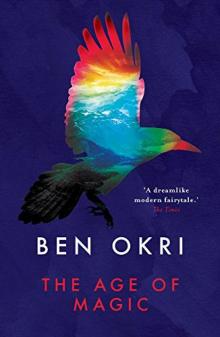 The Age of Magic
The Age of Magic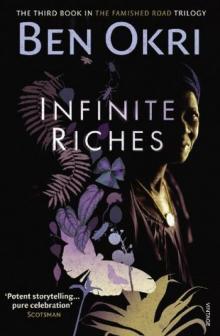 Infinite Riches
Infinite Riches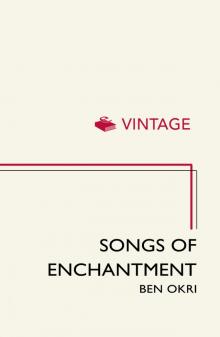 Songs of Enchantment
Songs of Enchantment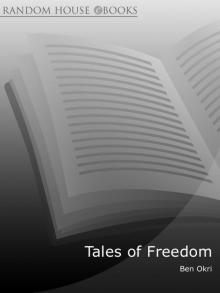 Tales of Freedom
Tales of Freedom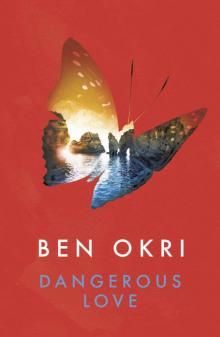 Dangerous Love
Dangerous Love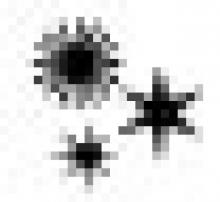 Starbook
Starbook The Famished Road
The Famished Road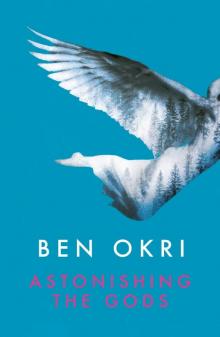 Astonishing the Gods
Astonishing the Gods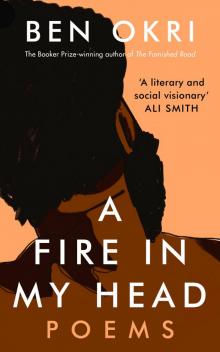 A Fire in My Head
A Fire in My Head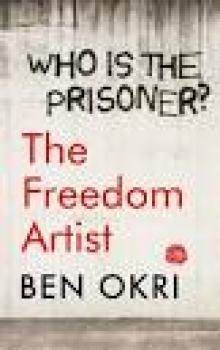 The Freedom Artist
The Freedom Artist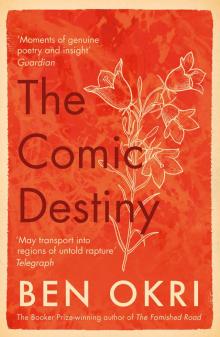 The Comic Destiny
The Comic Destiny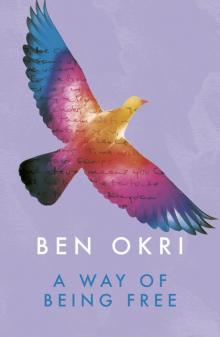 A Way of Being Free
A Way of Being Free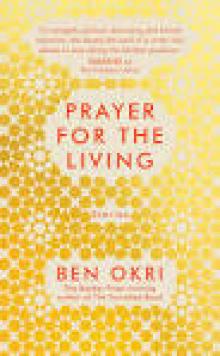 Prayer for the Living
Prayer for the Living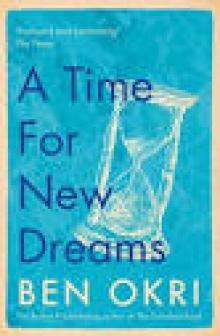 A Time for New Dreams
A Time for New Dreams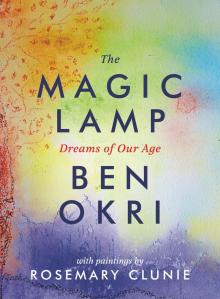 The Magic Lamp
The Magic Lamp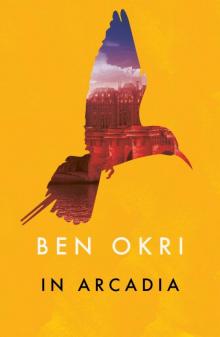 In Arcadia
In Arcadia